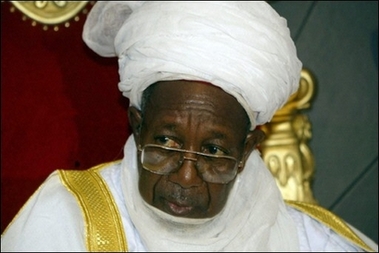


Posted by Kaye Whiteman on



The death in an air crash near Abuja of Alhaji Muhammadu Maccido Abubakar III, 19th Sultan of Sokoto, at the age of 80, is an agonising milestone in Nigeria's history, because of not just the shocking circumstances of his death, but also his particularly prominent role in Nigeria's political and religious life.
* A Muslim leader, he tried to foster unity among Nigerians
The death in an air crash near Abuja of Alhaji Muhammadu Maccido Abubakar III, 19th Sultan of Sokoto, at the age of 80, is an agonising milestone in Nigeria's history, because of not just the shocking circumstances of his death, but also his particularly prominent role in Nigeria's political and religious life.
As Sultan of Sokoto, not only was he the ruler of the Sokoto emirate in north-western Nigeria, but the title also gave him the primacy among all Nigeria's emirs, by virtue of descent from Othman Dan Fodio, founder of the Sokoto caliphate in the 19th century, a confederation of rulers that extended over most of the northern part of Nigeria, from Ilorin in the west to Adamawa in the east. This position was reinforced by his chairmanship of the conference of northern traditional rulers.
Article continues
--------------------------------------------------------------------------------
--------------------------------------------------------------------------------
Moreover as Sarkin Musulmi, or commander of the faithful, he was seen as the spiritual leader of Nigeria's 70 million Muslims, a role again inherited from Dan Fodio, to whose bloodline he belonged. Although strictly speaking he was a secular leader, his religious vocation was underlined by the fact that he was president-general of the Nigerian Supreme Council for Islamic Affairs.
Born in Sokoto, he was the eldest son of Sir Siddiq Abubakar III, who ruled as Sultan from 1938 to 1988, spanning the later colonial period and the three turbulent decades after Nigeria's independence. Although the succession in the sultanate depends on the kingmakers' choice from among the families of the descendants of Dan Fodio, Maccido always had the "electable" feel of a crown prince, and was given the title Sarkin Kudu (lord of the south).
He was educated at the clerical training college in Zaria, and in 1952-3 came to Britain to attend the South Devon technical college. He became district head of Talata Mafara, as well as serving as commissioner in the state government in Sokoto in the 1970s. An incursion into the politics of the second republic proved unrewarding, and he returned to local administration. He passed several decades in the shadow of his increasingly prestigious father, who, when he died shortly after his golden jubilee, had almost legendary status.
The 1988 succession was not at all straightforward. Although the Sokoto kingmakers were in favour of Maccido, the then military president of Nigeria, Ibrahim Babangida, had other ideas and managed to secure the imposition of Ibrahim Dasuki, a wealthy civil servant turned businessman. The interference in traditional processes and his uncertain lineage connection meant Dasuki was not well viewed in Sokoto, and there were riots on the announcement. Ironically, it took a change of government and the arrival of General Sani Abacha's regime late in 1993 for the measure to be reversed, and Maccido eventually became sultan at the age of 70 in 1996, after Dasuki had been deposed. There were those who thought that the Abacha connection gave Maccido's sultanate an unfortunate start, but it was evident that in Sokoto the change was simply perceived as righting a wrong.
Moreover, with the arrival of Olusegun Obasanjo's regime and the return to civlian rule in 1999, Maccido came into his own. He was so patently a gentleman and an honest figure of authority that he was able to use his prestige to intervene in the religious disturbances that flared up in northern towns in the early years of the regime. Although he publicly recognised the moral virtue of the sharia justice system, he was thought to have kept a certain distance from those northern governors who applied it with undue enthusiasm.
In the course of Maccido's sultanate, Sokoto was to mark two significant anniversaries - one, in 2003, the sombre centenary of the surrender of the caliphate to Lord Lugard and British rule; the other, the celebration of the 200th centenary of the launch of Dan Fodio's famous jihad. The latter event was attended by President Obasanjo, dressed in a turban and on horseback. It was an occasion to laud Dan Fodio's virtues,"learning, tolerance and the rule of law".
Maccido spoke a correctly elegant English, and set great store by the virtues of modesty and courtesy. In his tribute for the Sultan's 80th birthday in April this year, Obasanjo said, "You have provided inspirational leadership to millions of the faithful and used that high office in fostering understanding and unity among Nigerians, irrespective of their religion or ethnic background." At a time when Nigeria is in need of great wisdom and restraint, he will be sorely missed.
A son and a grandson died with him in the crash. He is survived by one of his three wives and numerous children.
· Alhaji Muhammadu Maccido Abubakar III, Sultan of Sokoto, born April 20 1926; died October 29 2006

